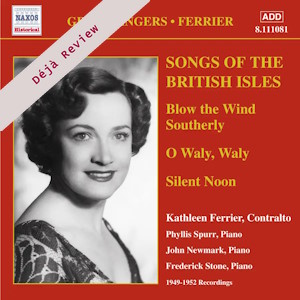
Déjà Review: this review was first published in April 2005 and the recording is still available.
Kathleen Ferrier (contralto)
Songs of the British Isles
Phyllis Spurr, John Newmark, Frederick Stone (piano)
rec. February 1949-December 1951, Decca Studios, Broadhurst Gardens, London; 5 June 1952, BBC Broadcast given in Concert Hall, Broadcasting House, London
Naxos Historical 8.111081 [75]
Both Ferrier fans and lovers of English solo song will appreciate this wonderful disc from Naxos Historical, in the Great Singers series. Traditional songs comprise the bulk of the music presented here, with a few songs by Quilter, Stanford, Parry, Vaughan Williams, Bridge and Warlock also featured.
The first thing that one notices is that the sound quality for the time (between 1949 and 1952) is excellent. Yes, there are a few crackles, particularly in Stanford’s A Soft Day, an occasional squeaky wheel and a slightly remote sound in the Quilter. However the disc is free of the intrusive noises that those who tend to listen to modern recordings find so disturbing, and aficionados of historical recordings have learnt to tolerate. Ferrier’s rather dated prominent vibrato does not detract, either, but suits the style of the pieces.
One is immediately struck by Ferrier’s lovely rich tone, litheness and sweetness of voice, and how she invests all of the traditional songs with great character and sensitivity. The merrier ones, such as Keel Row, dance, sparkling with vivacity, and in the more melancholic ones she is beautifully tender – as in O Waly Waly, and a version of Blow the wind southerly without accompaniment. Warmth, laughter and joy flood out in more light-hearted songs – the Stuttering lovers and the concluding Kitty my love – mirth radiating across to the listener. The regional accents she adopts are a true delight, particularly the fantastic Scottish one in The fidgety bairn. Her enunciation, too, is a joy to hear – crystal clarity reigns supreme here, which is all the more remarkable when one considers that some singers of the same period – naming no names! – occasionally sound as if they’re singing with their kerchiefs in their mouths!
I was less slightly less impressed by the performances of the original compositions. Admittedly this is not the best selection of Quilter songs (with the exception, of course, of his miniature masterpiece Now Sleeps the Crimson Petal!), yet these are all works that typically have the effect of hitting me in the solar plexus, sending me reeling back with emotion. I’m sorry to say that Ferrier was unable to squeeze anything resembling a tear from my nonchalantly dry eye. Not only does she takes these songs too slow – thus losing momentum and direction, but she does not invest them with enough feeling, doesn’t quite manage to bring them to life or capture their soul. Although certainly the greatest female rendition I’ve ever heard, Ferrier cannot scale the heights of John Mark Ainsley (on Hyperion), and songs that are meltingly, heart-breakingly beautiful under his touch become more pedestrian and less awesome (in the real sense of the word) with her.
Vaughan Williams’ Silent Noon is similarly not as dramatic as with a male voice – but then I was brought up with Tear on the London label, a version I would still instantaneously recommend to anyone. Ferrier is too slow to flow, and lacks Tear’s atmosphere and colourful contrasts. Bridge’s vivacious Go not, Happy day also suffers from a too leisurely pace, and comes across as a little too heavy and laboured. I would once more advise turning to John Mark Ainsley on Hyperion for the two Warlock songs. Ferrier sings Sleep too straight – she does not give it the haunting, dark quality that it needs, and Pretty ring-time is here too earth-bound. On the other hand, Stanford’s Fairy Lough is given a light and delicate rendition that is quite beautiful.
One does feel, however, that it is in the traditional songs that Ferrier really shines, which she seems to endow with greater emotion, capturing the mood of the songs perfectly. Unlike the original compositions, where the lagging tempo hampered the expression, the traditional songs are fairly well-paced. The tendency to be a little on the slow side here translates as unhurried, relaxed and serenely confident.
The three pianists – Phyllis Spurr, John Newmark and Frederick Stone provide sympathetic and unobtrusive accompaniment throughout, excelling in a few places – the Lover’s Curse, for example, where passion bursts through in the piano as well as in the voice.
Despite my reservations about the Quilter, Bridge, Vaughan Williams and Warlock, I can thoroughly recommend this disc, as Ferrier’s craftsmanship in the traditional songs alone is quite incredible. One need only listen to Willow Willow to be amazed at her remarkable control, and her masterful, spirited and dynamic touch.
Em Marshall
Help us financially by purchasing from

Contents
TRADITIONAL:
Ma Bonny Lad [1.49]
The Keel Row [1.47]
Blow the Wind Southerly [2.21]
I have a bonnet trimmed with blue [1.15]
My boy Willie [1.47]
I know where I’m going [2.21]
The fidgety bairn [2.49]
I will walk with my love [1.58]
Ca’the yowes [3.24]
O waly, waly [3.33]
Willow Willow [3.30]
The stuttering lovers [1.46]
Roger QUILTER (1877-1953)
Now sleeps the crimson petal [2.33]
The fair house of joy [2.36]
To daisies [2.13]
Over the mountain [2.14]
TRADITIONAL
Have you seen but the whyte lillie grow [2.27]
Ye banks and braes [3.08]
Drink to me only [3.03]
Down by the Salley Gardens [3.06]
The lover’s curse [2.59]
Sir Charles Villiers STANFORD (1852-1924)
The fairy lough [3.44]
A soft day [2.56]
Sir Hubert PARRY (1848-1918)
Love is a bable [1.44]
Ralph VAUGHAN WILLIAMS (1872-1958)
Silent Noon [4.56]
Frank BRIDGE (1879-1941)
Go not, happy day [1.38]
Peter WARLOCK (1894-1930)
Sleep [2.51]
Pretty ring-time [1.22]
TRADITIONAL
Come you not from Newcastle [1.36]
Kitty my love [1.23]

















